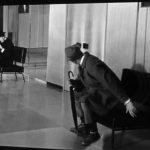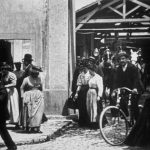Description of a Self-Portrait: Jean-Luc Godard, 1930-2022
Shortly after Jean-Luc Godard’s death at the end of 2022, the Parisian Ménagerie de verre, a private art space primarily dedicated to dance, showed excerpts from the late work of the grand master, in a ‘visual and sonorous journey around five films made by Godard between 1999 and 2018’. Planned by his producer Jean-Paul Battaggia […]










